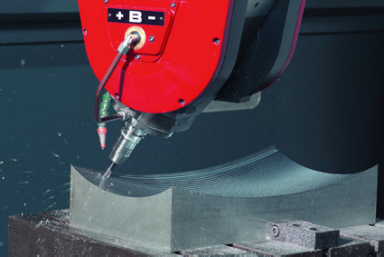“This marks the successful completion of two and half years of preparation work of the project partners involved”, says Dr. Britta Nestler, professor at the Faculty of Information Science and Business Informatics of the Karlsruhe University of Applied Sciences and initiator of the joint course of lectures for PhD students. The proposal was submitted by the Institute of Computational Engineering of the Karlsruhe University of Applied Sciences, the Institute for Production Technology, the Institute of Reliability of Components and Systems, the Institute of Materials Research I, and the Institute of Technical Mechanics of the Universität Karlsruhe as well as by the Fraunhofer Institute of Materials Mechanics at Freiburg.
Associated members are the Institute of Forming Technology of the University of Stuttgart and the Institute of Forming Technology and Lightweight Construction of the University of Dortmund. “The course of lectures for PhD students will cover the interdisciplinary field of research and development in computational engineering - materials sciences - production technology”, explains Professor Detlef Löhe, Vice President of the Universität.
In recent years, the importance of computer-supported simulation in fabrication technology increased constantly. As a result, the number of complex experimental studies for the optimum management of production processes and the determination of product properties was reduced and development times of new products were shortened. Strategies to simulate individual isolated fabrication processes have reached an advanced stage and been implemented successfully in many cases. Major fields of application are the production of car body or gear components.
“Simulation-based production process development promises to result in enormous advantages in competition in the field of fabrication technology”, underlines Nestler, “but still two crucial steps are lacking: The individual simulation steps have to be linked with each other, such that complete process chains in fabrication can be simulated reliably. On the other hand, a reliable prognosis of the behavior of the fabricated component under operation conditions must be possible. The central research idea of the course of lectures is to develop simulation methods for the description, evaluation, and optimization of component properties in linked fabrication processes and to verify them by experimental studies.”
Over a duration of 4.5 years, 14 PhD and two post-doctoral students will be educated. From the DFG funds, 16 high-quality positions will be established at the Universität Karlsruhe and the Karlsruhe University of Applied Sciences. If research work and the qualification concept will meet with success, further funding for another 4.5 years will be applied for, such that total duration will be 9 years. The course of lectures for PhD students will be established at both universities in the coming 2008/09 winter semester already. One third of the PhD students will do scientific work at the Karlsruhe University of Applied Sciences, the others at the Universität.
“For us, this is a crucial novelty”, says Professor Dr. Karl-Heinz Meisel, President of the Karlsruhe University of Applied Sciences, because we will be able to offer high-quality PhD positions to highly qualified masters, without these applicants having to pass a complicated PhD qualification procedure at a university.” This is due to the high scientific standard of the institutions organizing the course of lectures, as was confirmed by DFG funding. “It also reflects,“ continues the rector, “the high scientific level of research and teaching that may be reached by a university of applied sciences.”
According to Vice President Löhe, “the course of lectures for PhD students is another step towards using research resources and promoting young scientists in Karlsruhe”. The university professors involved in the course of lectures are also working at the Forschungszentrum Karlsruhe - and, thus, at the Karlsruhe Institute of Technology (KIT) - and at the Fraunhofer Institute of Materials Mechanics at Freiburg. This is an ideal basis.
The Karlsruhe Institute of Technology (KIT) is the merger of the Forschungszentrum Karlsruhe, member of the Helmholtz Association, and the Universität Karlsruhe. This merger will give rise to an institution of internationally excellent research and teaching in natural and engineering sciences. In total, the KIT has 8000 employees and an annual budget of 700 million Euros. The KIT focuses on the knowledge triangle of research – teaching – innovation.
The Karlsruhe institution is a leading European energy research center and plays a visible role in nanosciences worldwide. KIT sets new standards in teaching and promotion of young scientists and attracts top scientists from all over the world. Moreover, KIT is a leading cooperation partner of industry.
hg/ zk, May 14, 2008

